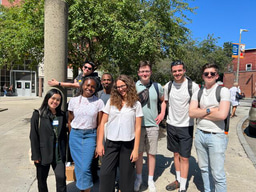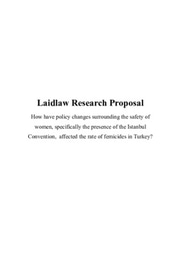Summer 1 Reflective Report
This report will outline my reflective experience surrounding Summer 1 of my Laidlaw project. I will explain the holistic process of completing my project, how it shifted and changed over the course of the summer, my influences and sources of inspiration, and the drawbacks to taking on my project and its outcome. I will also expand on what skills I have developed, seeing how I may be able to apply them next summer for my leadership in action work, as well as whether I would have done anything differently over the course of this summer.
In taking on the application for the Laidlaw Scholarship, I knew that the topic I chose would have to be something that hit close to home. I am painfully aware of my tendency to step away from projects that I am not deeply passionate about, and decided that if I was to follow through with this project, it would have to relate to my subject as well as my identity. Being a woman in Turkey was an element
of my life that had been omnipresent, but that I had done very little to investigate academically: being interested in politics meant that much of the reading I did was theoretical, and although I connected to ideology in a personal way, reading about the state of women in the country made the issue feel infinitely closer to home. I also felt that I could learn more about a subject that mattered to me from an academic perspective– one that didn’t exist prior to the beginning of the project– and expand my terminology in a multilingual context. Having stakes in the project was something that fuelled my interest, especially at the beginning when it was still in the literature review stages. Femicide had been touched upon internationally and locally, even within Turkey, but even then there were always gaps of knowledge. I felt dually motivated by this gap as well as the personal connection: my project seemed to be a way to both gather more information about the nature of these women’s deaths, as well as consolidate my relationship with being a woman as well as being Turkish. This was the push I needed to pull my project together: it mattered to me, and it mattered to hundreds of people that I cared really deeply about.
And as such, my summer project began with a critical literary analysis of the subject at hand. I knew about the topic really only through word of mouth: I followed protest accounts on Instagram and heard about my mom’s growing concerns, but didn’t realise the wealth of knowledge that existed both on the culture of women’s rights and the patriarchy in Turkey, as well as the theory behind the existence of femicides internationally. Femicide research has been done before, but on a social science level, and I both had to develop my tolerance for the subject as well as my ability to decipher what areas of different papers mattered to my research. I found it especially difficult to process the presented data: on many occasions, quantitative research had been carried out and presented in a way
that was indigestible for my undergraduate research skills. I did, however, glean the most information in my investigation of the history of the Istanbul Convention, and my exploration of the judicial system in relation to intimate partner violence. Academic works were good guiding sources but nothing proved to be more helpful than directly reading GREVIO reports. These GREVIO reports consisted of two strands: the government reports provided by the Turkish government, and ‘shadow reports’sent in by non-governmental organisations that supported the violence prevention of women and children. Comparing the differences was crucial in understanding that government data and information on the subject of femicide and women’s rights in Turkey was flawed and altered. It made sense that reports created by non-government organisations when taken and compared against government sources would be a highly beneficial way to organise and compare the impact of judicial reform on intimate partner violence and femicide at large. I was lucky and grateful to work with a literature review that encompassed different types of research, both on an academic and non-academic level. However, after seeing that the qualitative data was so potent, I was worried that by taking on this project and posing the question that I did, I was limiting a potentially beneficial qualitative scope of knowledge. I wanted to include all of these social factors, but didn’t know how: in my interest for simple answers and processable data, I had somehow cut off this rich qualitative discourse from my project. However, discussions with my supervisor and peers quelled my nerves: rather than treating my project as a limiting investigation, I had the opportunity to explore new skills I would have otherwise never seen. It also allowed me to accept that the answer to my research question could be broader and more complicated than a statistical “yes” or “no”. I felt as though moving forward, I had the tools to explore an answer that, albeit more lengthy, better encompassed the extent of my research and investigation on many levels.
Realising that I had picked a project beyond my scope was, frankly, a slap in the face. I knew that I would have to settle for a conclusion that was ‘general’ and had a lot less information than I sought out, but the humility of a 6-week project that essentially concluded by displaying a general theory and opening up more questions was important in ensuring that both the decision making process of my project as well as the final outcome were appropriate to my timeline. I am grateful for this opportunity because it demonstrated the time commitment of research and the outcome of that type of commitment.
Of the steps in my project, the most challenging was the data collection and processing. Collecting the data proved to be lengthy and difficult, and I saw myself handling depressing news on a daily basis. My process was slow and painful and involved translating, cross-checking, and reading ‘fad articles’
to sift through exaggerated words and coded language for helpful data. Although this was the case, I gained a whole other set of skills in the process: new descriptive language in both Turkish and English to explain my project’s findings, and my first ever experience sorting and organising categorical data in a statistical setting.
One of the most powerful elements of my project was connecting with like minded people engaged in work around women’s rights and safety, especially in Turkey. Having done most of my research while based in Istanbul, I had the opportunity to speak with a professor at Bogazici University about my research project and its progress. She was extremely effective in guiding me through the greater qualitative research and the questions that I could turn to address if the quantitative research did not prove to be fruitful. Together, we were able to discuss the conclusion that I felt (and almost worried) was entrenched within the literature review I had conducted a few weeks before. I felt significantly less daunted by the possibility of a project that didn’t reap correlatory findings: rather, it seemed that I would get more out of the project if I did what I had previously thought to be a “failure” in terms of research. When I did stumble into inconclusive results, I was kind of encouraged: it had meant that I did the reading and kept my options open to other alternative explanations for fluctuations in femicide rates in Turkey over the past 4 years.
Another element of my project which was deeply relevant to my experience was my development as a leader. I was able to both critically evaluate leadership in a professional setting (in the context of Erdogan’s decision as a political leader to revoke the convention from a national lens), as well as engage with and accelerate a self-directed project, both of which were leadership-oriented exercises that challenged my skill set. From a two-pronged perspective, I was able to both develop my strengths and use them to my advantage, as well as expose some of my weaknesses to push myself to improve. My ability to communicate effectively, as well as my engagement in literature, were both strengths that I quickly employed in reaching out for advice and discussion around my subject. Although this made the literature review and my meetings with professors smooth sailing, I struggled immensely with self-directed time management. I found myself plunging into a week of work without having planned out how much work I was aiming to accomplish each day– setting metrics was something I was inexperienced in and I had a lot of trouble achieving my goal in a timely manner because I didn’t split my work up into smaller, bite-sized pieces on a daily and weekly basis. As such, I had to rely on external advice from peers, family, and my ALS group in order to understand what exactly I needed to do about my time-management problem. In the process of this mistake, I learned an additional leadership skill that I had previously shied away from: the power of asking for help. It was my first
time doing this type of long-term research project– I needed to be led, even by loved ones, and to learn the skill of extending a helping hand from the people around me, as well as accepting the normality of not knowing how to do something. What I thought was essentially an over reliance on others was actually a type of communication that all leaders in research settings need to develop, and the humility of knowing that I simply didn’t know how to do certain things was important in allowing me to necessarily ask for help. Furthermore, I was able to use this constructive feedback to develop new and unrealised skills in terms of research communication, which is a valuable leadership skill: communicating my findings via written and oral communication to a wide variety of people both in and out of the political science field was a necessary addition to my academic toolkit. An important facet of leadership is adaptability, and creating a knowledge base of my field that was adjustable for varying audiences had a profound impact on my ability to allow others to connect with my work. The mixed input of experts as well as loved ones meant that I had a developed, versatile topic and presentation– something that my insulated lens as a political science student wasn’t even aware would be a challenge for others. Honing in on vulnerability in a leadership context, time-management and reasonable self-accountability, and expanding the breadth of my communication styles were all necessary in my development as a leader through the Laidlaw program, and within the context of my project.
My Laidlaw project was inherently life changing. I delved into a world I’d cared about for years with an academic lens to supplement both my knowledge in the subject, and my attention to detail and research skills in a college setting. I hope to continue to work on my research on my own time, and spread information on the subject on a global scale, and I am grateful for the Laidlaw Foundation for providing me with the opportunity to do so.


Please sign in
If you are a registered user on Laidlaw Scholars Network, please sign in